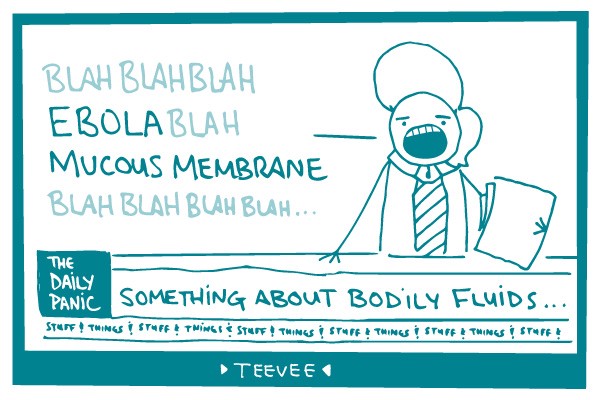
A lot of media outlets have made a good effort to clarify how a person can and cannot get Ebola. But confusion persists. Could it be a health literacy issue?
Think about it: When was the last time that terms like “bodily fluids,” “mucous membranes,” and “infectious” got so much traction in newspapers and news reports? Is it safe to assume that people know what these terms mean? (And that everyone has seen Outbreak at least a dozen times like us health geeks?) Of course not, dear readers.
Let’s take a look at some common terms used in the Ebola news coverage.
Bodily fluids
This one is everywhere. As in, “Ebola is passed from person to person by contact with infected bodily fluids.” But what exactly is a bodily fluid?
It helps to give examples:
You can get Ebola from contact with the bodily fluids of someone who has it — for example, blood, saliva (spit), vomit (throw up), feces (poop), urine (pee), or sweat.
(And if you need advice about how to handle those, umm, sticky terms, we’ve got you covered.)
Direct contact
This goes hand-in-hand with “bodily fluids,” and unfortunately presents equal potential for confusion. You need to have direct contact with the bodily fluids of someone with Ebola in order to get it. But what other kinds of contact are there?
Again, be sure to clarify the information with examples.
To get Ebola, you have to have direct contact with the bodily fluids of someone who has it. Examples of direct contact include infected fluids getting into your mouth or eyes — or touching a cut on your skin.
Mucous membrane
This is a jargon term if we’ve ever seen one. And what do we do with jargon, team plain language? Define, define, define.
Ebola spreads through direct contact with mucous membranes such as your eyes, your mouth, or the inside of your nose.
You get the idea. Remember: In the face of fear and uncertainty, plain language saves the day. Keep it up, fellow health literacy advocates!
The bottom line: The Ebola outbreak is an extremely tragic situation. It’s also a very good reminder of why plain language and clear communication are so important.
Browse recent posts